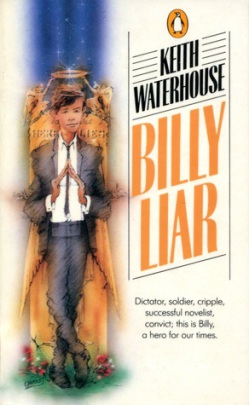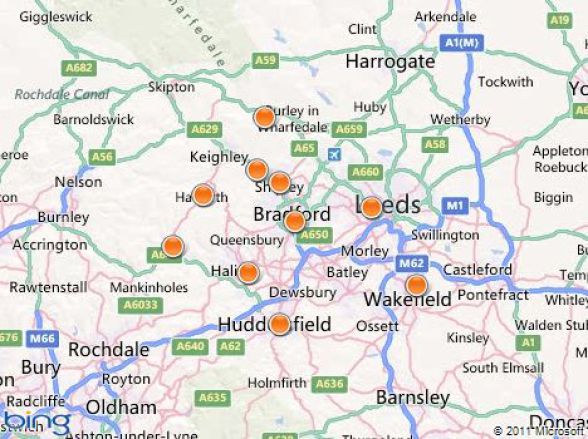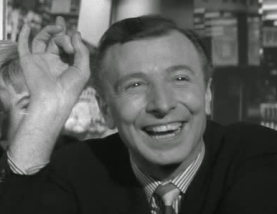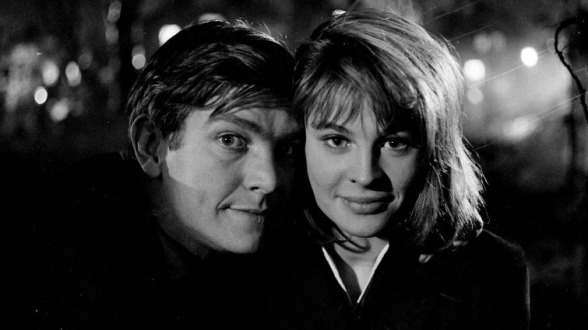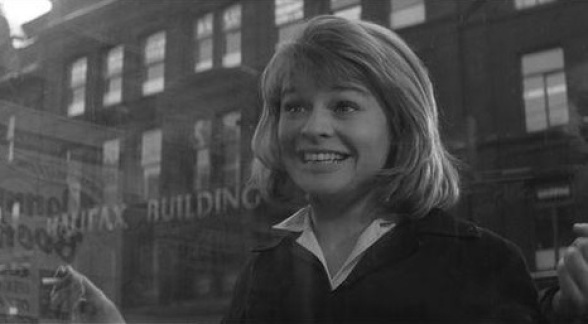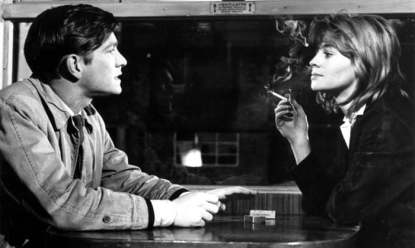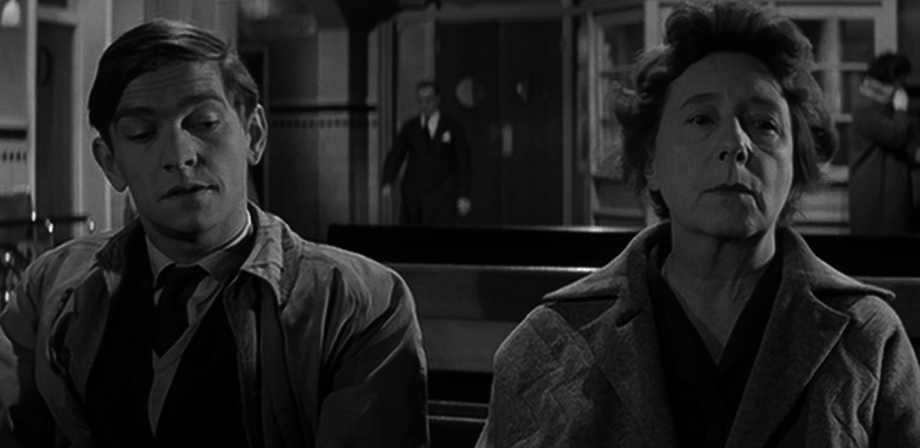
BILLY LIAR (1963)
Based on the novel of the same name by Keith Waterhouse published in 1959
Billy Liar, one of the most famous of British 60s films, was adapted from Keith Waterhouse's 1959 novel of the same name, although there was also a stage play, written by Waterhouse and his friend Willis Hall which was first staged in 1960 (with Albert Finney in the title role) before the film version, again scripted by both Waterhouse and Hall, was released in August 1963. The concept was so iconic and successful that a TV series followed in 1973, running for two series, as well as a stage musical, starring Michael Crawford, in 1974. Waterhouse also wrote a follow up (which I'm afraid I haven't read) called Billy Liar on the Moon, published in 1975.
The film is, quite rightly, cited as a key film of the 1960s, and is often referred to as a 'bridging' film, linking the New Wave films of the late 50s and early 60s with the Swinging London films that soon followed in the mid-60s, and I have commented on this aspect of the film in my page on the New Wave films elsewhere on this site. Here though I wanted to make some comments and points on the adaptation of the novel, as some of the differences are quite interesting, particularly the ending.
All references to page numbers are to the Penguin edition (see above) published in 1962 and last reprinted in 1985.
Narrative structure
The film follows the book very closely in most respects, starting on a Saturday morning in September and ending around midnight the same day, following the (mis)fortunes of William Fisher, aka Billy Liar, an undertaker's assistant in a Northern town (Bradford in the film, named as Stradhoughton in the book), as he faces the challenge of leaving his job for a (imaginary) job script writing in London with his girlfriend of sorts Liz, whilst trying to extricate himself from being engaged to two other women, Barbara and Rita. Billy is not only a congenital liar, he is also a fantasist who has dreamt up a country called Ambrosia (which he is the leader of, naturally) and often retreats into this world (indeed the book starts: Lying in bed, I abandoned the facts again and was back in Ambrosia). However the film takes advantage of its visual medium and there are lots more fantasy sequences of this nature than in the book. He also does a lot of what he refers to as 'No 1 thinking', imagining his parents as wealthy and sophisticated, for example, and again this is repeated in the film. The table belows shows how closely the film follows the novel:
| Book | Film | |
| Chapter 1 |
Billy gets up late for work, arguing with his parents and grandmother over breakfast before leaving the house. All the key elements of the film are introduced as the narrative is in the first person. |
As per the book, although a fantasy sequence is inserted where Billy goes to prison but becomes a successful author as a result. |
| Chapter 2 | Billy arrives at work (Shadrack & Duxbury) where we meet his friend Arthur Crabtree and his adversary, Stamp. His boss, Shadrack, wants to see him about some matter after early closing. Stamp mentions that he has seen a friend of Billy's, Liz, in the town. | As per the book, although here Billy pretends to speak to Danny Boon, a comedian he has written to re some of his scripts and material, as he is in town for a couple of days. |
| Chapter 3 | Billy and Arthur go to the Kit-Kat cafe in town during their morning break, where they meet Rita, who works there; Billy appears to be engaged to Rita, although he is also engaged to Barbara, with the added complication of what to do about the engagement ring. |
As per the book, although on the way back to work Arthur points out Liz to Billy, who says she goes all over the place as the mood takes her. There is then the famous sequence showing a carefree Liz wandering over town, ending up meeting Danny Boon (which does not happen in the book). |
| Chapter 4 | Billy meets up with Barbara in a churchyard, and agree to meet again at 4pm before going to the Roxy in the evening. | In the film, this scene is run together with another scene later in the book where Billy meets Barbara again, so the film misses this section out in effect. |
| Chapter 5 |
Billy goes back to the undertaker's office to meet Shadrack; he resigns, but Shadrack refuses to accept the letter, saying there are a number of matters that need to be sorted out, including the calendars that Billy didn't post the previous Christmas. The scene ends with Shadrack saying that they will speak again on Monday. |
Very similar to the book, although another fantasy sequence is inserted. |
| Chapter 6 |
Billy goes home for lunch at 14:30, where there are more arguments about him going to London. Billy reads the letter he has received from Danny Boon, so we know what it says (discussed below). His Gran has 'a turn' but appears to recover.
Billy then goes to Stradhoughton Moor to try and get rid of some of the calendars, but he meets Councillor Duxbury who gives him some advice.
|
As per the book, although in the film Rita turns up at his house and they argue about her going to tea the next day, and about the engagement ring.
Billy meets Duxbury on the moor as in the book, although on the way there another fantasy Ambrosia sequence is inserted.
He then meets Danny Boon in town, in a scene (see below) which is not in the book. |
| Chapter 7 |
Billy meets Barbara again, firstly on the bus and then they get off at the cemetery gates. He admits making up a lot of stories about his family, and apologies for lying, but them immediately encounters Arthur's mother, and introduces Barbara as his sister, Sheila, which Mrs Crabtree takes exception to as she knows Barbara very well. |
This scene is merged with the one in Chapter 4 (see above) so is omitted here in the film. |
| Chapter 8 | At 5pm, Billy and Arthur are back in the Kit-Kat cafe, but then go the X-L Disc Bar, a record shop in town; Stamp is there again, but so is Liz, upstairs in the classical music section, helping Maruie the owner out. Billy meets Liz for the first time in the book, and it is revealed that she has been away for five weeks. | This scene, or scenes, is omitted in the film. |
| Chapter 9 |
It's now 19:30; Billy says that he has been wandering around town for an hour and a half, and is now on his way to The New House pub where he does a comedy turn (see below). Unusually his father is there, and Billy sees him talking to Duxbury, which worries him. |
This scene is also omitted in the film, where no reference is made to Billy having a 'residency' at the pub on Saturday nights. |
| Chapter 10 |
At The Roxy, a local dance hall. Rita is with Stamp, whilst Arthur is singing with the band, including a song that Billy and Arthur have written together. Billy meets Liz for the second time, but then he has an argument with Arthur, the latter particularly fed up with Billy's constant lying. Rita and Barbara finally meet each other and a fight ensues, whilst Billy is caught out in his lies and stories by Liz. Shadrack is also at the dance (he's only 25 years old in the film) and tells Billy that other matters have arisen and that he is therefore suspended from work until further notice. |
The film picks up from after the new scene where Billy meets Danny Boon, having omitted the previous few chapters. There are a few differences (some discussed below), for example Shadrack - who would surely not be dancing at the Roxy, being played by Leonard Rossiter, who was 37 at the time - does not speak to Billy and certainly does not suspend him, but otherwise the film follows the book very closely here. |
| Chapter 11 |
Billy and Liz go for a walk; she tells Billy that she is not a virgin, and strongly suggests that they should make love there and then. Billy asks her to marry him, but they are interrupted by Stamp and two of his friends and return to the Roxy. |
As per the book, with much of the same dialogue, only in the film they arrange to meet at the train station at midnight to catch the train to London. |
| Chapter 12 |
Billy waits outside at the Roxy for Liz, who has gone back to fetch her handbag, however he gets fed up waiting for her and goes and gets some chips before going home. Once there he finds out that his Gran has been taken to hospital and that his mother has gone with her (they were trying to get hold of him at the Roxy but he ignored the tannoy). There is another argument with his father, who has found about the missing calendars amongst other things, having spoken to Duxbury at the New House earlier in the evening. |
In the film there is no need to go back to the Roxy, so Billy goes home and the rest of the scene is as per the book. |
| Chapter 13 |
Billy goes to the hospital (or infirmary), and his mother has a go at him about his lying; he has his suitcase with him and tells her that he is going to London. His mother is then told that Billy's grandmother (her mother) has died, and he then leaves to catch his train. |
As per the book, although a fantasy Ambrosia sequence is inserted at this point once his gran has died. |
| Chapter 14 | Billy, after a bit of Ambrosia fantasising, turns up at the rail station and buys a single ticket to London for the 01:35 train (the time being 12:50). However there is a train to Doncaster at 01:05, and Billy sees Liz at the ticket office buying a ticket to Doncaster and she catches the train a few moments later. He then decides not to catch his train, and walks back home, falling back into Ambroisa fantasies. | As per the book, the film ends at the train station, but the big difference is that he has arranged to meet Liz and they are supposedly going to go to London togehter, but he bottles it and (deliberately?) misses the train whilst Liz goes off to London. He then walks home as in the book. |
Where is Stradhoughton?
In the book Billy's fictional town, which he is distinctly unimpressed with, is Stradhoughton, somewhere in Yorkshire; most of the film is shot in Bradford (see images below) but this was not Waterhouse's original intention, as Bradford, like Leeds, Wakefield and other places, is mentioned in the book. When Stamp moans at Billy and Arthur taking a long time over their coffee break in the morning, he snidely remarks "Where've you been for your coffee - Bradford?" to which Billy replies "No, Wakefield" suggesting that Wakefield is further away. At the end the train to London calls first at Leeds, where you can change for Bradford and Ilkely, which suggests that Stradhoughton is north, or northeast, of Leeds, although there is also a train to Wakefield and Doncaster. Stradhoughton is a small town, with a moor within easy walking distance, so if it is based on a real place my suggestion would be somewhere like Shipley or Keighley, although it's probably just based on a town like that rather than meant to be anywhere specific. Reelstreets have some pretty good 'then and now' shots as usual, found here: https://www.reelstreets.com/films/billy-liar/ but Dave Rattigan has published some really excellent ones via britmove forum, here's a selection of his photos comparing locations:
Billy, Arthur, their ambitions and Danny Boon
There are some subtle differences between Billy in the book and his character in the film; in the film his hopes and ambitions are seen to be largely imaginary and all in his own mind; his only achievement is that he has written a song, 'Twistarella', with Arthur, which is played by the band at the Roxy. Danny Boon is clearly a successful comedian, who just happens to be in town, and Billy pretends, in front of Arthur and Stamp at work, to speak to him at his hotel and makes an appointment for 3pm that afternoon (noticeably Arthur never asks him how this key meeting went when he sees him later in the day). However when he actually gets to meet him, it's clear that Boon has no knowledge of him and is keen to get rid of him:
In the book we never get to see Danny Boon, but a letter he has sent Billy is mentioned (I took the used envelope out of my pocket with the letter in it - p7) and in Chapter 6, on pages 84/85 we get to see what it is and what it says:
Dear Mr Fisher,
Many thanks for scripts and gags, I can use some of the gags and pay accordingly. As for staff job, well, I regret to tell you, I do not have 'staff' beside my manager, but several of the boys do work for me, you might be interested in this. Why not call in for a chat next time you are in London? Best of luck and keep writing,
Danny Boon
Now one might agree with Billy that it did not seem after all much to go on, but I read this slightly differently; first of all Boon has replied to Billy, and has clearly said that he can use some of the material and pay accordingly, so Billy's material must be OK and he can at least earn some money from writing comedy material. The letter also says that Billy might be interested in working for him, and encourages him to look him (Boon) up when he's next in London, so I see this as quite encouraging. The film's version is much more pessimistic.
The film also completely removes that part of the book which shows that Billy is actually already a performer (as is Arthur). In chapter 2, on page 31, Billy explains:
Every Saturday night I did a club turn down at one of the pubs in Clogiron Lane, near where we lived. It was a comedy act, but not the kind of thing Danny Boon would be interested in: a slow-burning, Yorkshire monologue that was drummed up mainly by Arthur and me at these sessions in the office. Arthur was more interested in the singing side. He did a turn with the band at the Roxy twice a week, Wednesdays and Saturdays, trying vainly to get them to play the songs we had written between us.
In chapter 9 Billy is seen doing his turn; it all seems quite painful, and he seems to regard the audience with contempt (and himself with self-contempt) but it does show that he has the nerve and confidence to get up on stage in front of an (admittedly disinterested) audience, and as he has clearly been doing this every Saturday night for some time, he must have something about him otherwise the pub wouldn't keep booking him. In a similar fashion, Arthur sings with a band at the Roxy twice a week, and in the book it is Arthur who sings the song they have written together (here called 'Can't get along without you', in the film it's called 'Twistarella') and Billy at one point says of Arthur:
He looked like Danny Kaye or somebody doing a relaxed season at the Palladium, and I could not help admiring his poise and the professional way he stood there doing nothing....He always affected an American accent when he sang. I disliked it, but I had to admit it was good. (p128)
The film version therefore plays all this down, and promotes much more strongly the idea that Billy is an idle dreamer who will never amount to anything.
Billy and Liz
Having re-read the book again in the last day or so (and having seen the film endless times) I'm quite intrigued by the character of Liz and the nature of her relationship with Billy. There's no doubt that she is a far more glamourous character in the film (entirely understandable, given the commerical world we live in) and obviously the casting of Julie Christie had a profound impact on how the character was seen (Christie was not well known at the time, but it was not her film debut, as I've seen it sometimes asserted, she had been in a few films before Billy Liar, including a fairly substantial role in Crooks Anonymous). She is far from the stylish trendsetter depicted in the film; in the book she is first mentioned by Stamp, who describes her as:
"That scruffy-looking one. Her that always wore that suede coat" (p32)
and calls her Woodbine Lizzy.
When Billy meets her in the book: She was still wearing the same old things, the green suede jacket and the crumpled black skirt (p108)
and later at the Roxy: She was still wearing her old black skirt, but with a fresh white blouse (p129)
In chapter 11 Billy is waiting for Liz outside the Roxy, and when she comes out:
I looked up the blue-carpeted foyer at the cluster of girls gossiping outside the Ladies, and saw them part to let Liz through. Some of them stared after her. I noticed, not for the first time, how scruffy she was in her old suede jacket and her dusty black skirt, and it occurred to me that I had rarely, if ever, seen her wearing anything else. (p143)
Liz is not really physically described in the book, although mention is made of her 'round face' and 'plump arms' and her nickname of 'Woodbine Lizzy' suggests that she is a frequent smoker (but nothing unusual about that in those days).
Yet despite the first person narrative, it is still hard to work out the exact nature of the relationship between Billy and Liz. When Stamp first mentions her, Billy muses:
It was a month ago since she had last left, with only a chance good-bye, and this time there had been no postcards. It was part of the nature of Liz to disappear from time to time and I was proud of her bohemianism....but in less romantic moments I would fall to wondering whether she was tarting round the streets with some American airman. I had no real feeling for her, but there was always some kind of pain when she went away, and when the pain yielded nothing, I converted it, like an alchemist busy with the seaweed, into something approaching love. (p32)
When they meet in the X-L Disc Bar (Liz is helping out Maurie, the owner, who briefly appears in the film, as the person Liz is mouthing at through the shop window, see pic above) Liz challenges Billy to ask her where she's been for the last five weeks, but he decides not to take up the challenge, unsure himself whether he is afraid of the answer or not. When they next meet at the Roxy (their first meeting that day in the film) he tells her he is 'thinking' of going to London, but she never suggests going with him, or indeed that she is planning on going away again any time soon.
When they go for a walk, it's Liz who first asks Billy to marry her, but he doesn't seem to take her seriously (or perhaps want to?) She makes it clear to him that she wants to make love, spells it out for him that she's not a virgin, and then says (p151):
"You think that's why I'm always going away, don't you?" she said.
I shrugged, saying and thinking nothing.
"Ask me where I've been for the past five weeks."
"Does the geographical location make any difference?" I said with simulated bitterness, hoping to keep it all on this same sparring level.
"No, I don't suppose it does," said Liz.
After a conversation about his secret world ie Ambrosia, it is Billy's turn to ask her to marry him, and she simply replies 'Tomorrow'. Much of the dialogue in the section is repeated verbatim in the film, as can be seen in this clip:
The ending
A key difference between film and book is the ending; although the final page/shot has Billy returning home, lost in Ambrosian fantasy, the circumstances are very different, and there is no doubt in my view that the film is far superior.
In the book, after Billy and Liz are interrupted by Stamp and his infantile friends, they return to the Roxy for Liz to retrieve her handbag, but there is no explanation as to why she left it there in the first place and the film rightly ditches this element. Billy loses interest waiting for Liz and goes home, where he finds his Gran has been taken to hospital. This is where the book starts to lose any sense of character motivation, as Billy's decision to go to London seems to stem from his argument with his father, who has found the unposted calendars (and much else), and another reading of Danny Boon's letter seems to finally spur him into life. It is important to note that Liz plays no part in his decision, even though he only left her a short time ago, where he almost lost his virginity and where both asked each other to marry them.
After the hospital, Billy makes his way to the train station (again, this seems strange, as his Gran has just died and he would be expected at the funeral, and there is no urgent reason for him to go to London at this exact point) and buys a ticket to London. He meets Rita and Stamp again in the waiting room (repeated in the film) but in both book and film version the temptation to enable Rita to have one more dig at him seems to have been too good an opportunity to miss, as there is no reason whatsoever for them to be at the railway station at 1 o'clock in the morning. It is only then that Billy notices Liz at the ticket office, buying a ticket for Doncaster. This is the weakest part of the book; it is not explained at all why Liz, having just got back to Stradhoughton the day before, and having just asked Billy to marry her (and vice versa), should suddenly buy a ticket to Doncaster on impulse at 1 am (in the film she has just come back from Doncaster, but we are never told in the book where she has been for five weeks). On page 184 Billy asks:
"Why are you going to Doncaster?"
She grinned again, in the frank manner that gave nothing away.
"Oh, just - Doncaster," she said, shrugging amiably.
I said bluffly, in the man of the world voice: "Well, whatever you want in Doncaster, they've got it in London. Yes? Yes?"
She was shaking her head, smiling.
"One condition," she said.
I closed my eyes tightly and smote my forehead, teetering on the brink of a decision. All the details of it were there, in a compact parcel of No. 1 thinking, from the registry-office ceremony to the Chelsea attic. All it needed was the decision.
"And I wouldn't need the communal ring," said Liz. But I did not answer, and she knew that there was no answer.
Here's the famous film ending:
It's hard not to draw the conclusion that Waterhouse - now ably assisted by Willis Hall - realised the problems with his novel, and after the play (which, whilst retaining much of the dialogue, is very different, taking place almost entirely at the Fisher household), took the opportunity that the film presented to 'tidy up' the ending, which certainly makes much more sense than in the book, leaving us with the compelling image of Liz heading off to London (as was the entire British film industry from here on in) whilst Billy is left behind with his dreams and fantasies.
The pic at the top shows Billy (Tom Courtenay) and his mother (Mona Washbourne) waiting for news at the Infirmary.
